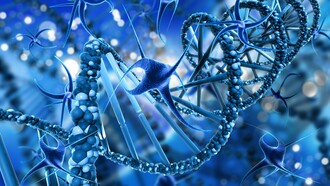Cancer is one of the leading causes of death worldwide. It is a derivative of somatic mutations accumulating over time within the nucleus of a cell. This allows the cell to divide freely and unregulated. Genes that are often mutated in cancer cells are frequently involved in the regulation of the cell cycle, where cells divide to create new cells. It is thought that there is a combination between nature and nurture to create cancer, yet the mechanism of how this works is unknown. There are environmental factors, such as smoking and UV light, that are associated with cancer. Inflammation is also linked to the generation of cancer cells, which can be influenced by both genetic and environmental factors. When considering how much of cancer is in nature and how much is nurture, it should be known that cancer is a broad term, encompassing different conditions with potentially different derivatives. Interactions between nature and nurture in cancer is also thought to vary between individuals. This can explain why not everyone who is exposed to the same environmental factors will get cancer.
Natural selection
When cancer develops through carcinogenesis, a cell gains mutations. This process has been likened to Darwin’s theory of evolution, where cells with mutations have an advantage in survival. Cells with a survival advantage may go on to create malignant tumours. Benign tumours can also be formed as a result of a cell accumulating somatic mutations. In cells that already show abnormal growth, the chance of acquiring further mutation is increased.
Tumour initiation
The development of a tumour is a process that occurs over time. The initial steps in tumour growth are initiation and promotion. Initiation can be either spontaneous or can be caused by factors such as cigarette smoke. For skin cancer, chemical carcinogens and UV light can be catalysts. These initiators damage DNA and can activate various genes involved in tumour suppression. Yet, one of these agents alone cannot cause cancer, a promoter is needed. Promoters do have very little or no carcinogenic properties on its own but can stimulate tumour growth when combined with an initiator. Repeated expose to agents such as UV light can cause proliferation of the initiated cell.
Tumour progression
The progression of a tumour occurs due to additional genetic alteration; this could be changes in gene expression. When cancer cells spread from their initial place, it is called the ‘metastatic cascade’.
The role of nature in cancer
It is understood that somatic mutations that lead to cancer arise due to both environmental and internal factors. Simple alterations to DNA can go on to be a factor in cancer formation, despite most damage to DNA being repaired. The cell cycle is the process that cells must go through in order to divide and create more body cells. It is a controlled process with various checkpoints to assess damage to DNA, cells size and growth signals. This aims to prevent damage being passed onto subsequent cells. If there is unchecked progression through a checkpoint, it can contribute to the probability of cancer cell development. Oncogenes are genes that can transform into a tumour cell. Oncogenes, when activated, can lead to the production of a mutant protein with increased unregulated activity.
The role of nurture in cancer
In the 18th century, it was found that environmental factors could contribute to cancer. These factors cause there to be alterations to the genetic code. Some known environmental factors include asbestos, radon, and arsenic. Environmental factors are thought to play a role in the early stages of cancer development by changing the genome. Tumour-promoting inflammation can arise from cigarette smoke and also cause tumour initiation. Dietary factors in obesity are also associated with tumour progression. Most likely, there is a combination of both nature and nurture, with their individual influences being difficult to separate.















